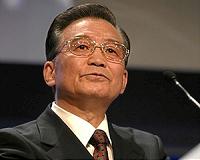 |
Dharamshala, India (AFP) April 27, 2011 Tibetan exiles elected a Harvard academic Wednesday as their new prime minister, who will face the daunting task of assuming the political duties of a global icon, the Dalai Lama. Lobsang Sangay, a 43-year-old international law expert, has never lived in or visited Tibet and represents a major shift from the historic dominance of Tibetan politics by older religious figures. His election followed the Dalai Lama's announcement last month that he would retire as the Tibetan movement's political leader, transferring his powers to the newly-elected head of the government-in-exile. Although the Dalai Lama, 75, will retain the more significant role of spiritual leader as well as his hold on major policy-making decisions, the transition will make Sangay a far more prominent figure than his predecessor. Sangay has publicly backed the Dalai Lama's policy of seeking "meaningful autonomy" for Tibet under Chinese rule, but his age and former membership of the pro-independence Tibetan Youth Congress has fuelled speculation that he may harbour a more radical agenda. In an interview with AFP in the Indian hill town of Dharamshala last month, Sangay acknowledged that the Dalai Lama was irreplaceable but added that there was a hunger in the Tibetan community to "see the younger generation taking over the leadership". More than 49,000 exiled Tibetans in India and overseas took part in the election and Sangay easily beat the two other candidates, securing 55 percent of the vote. In a statement issued from the United States, he was quick to make his loyalties clear, attributing his victory to the democratic, "far-sighted policies" of the Dalai Lama. "I take comfort in the fact that the changes we are going through are happening... while His Holiness is healthy and available to watch over us," he added. The question of the Dalai Lama's health and the impact his eventual death will have on the Tibetan movement is an sensitive one. China, which vilifies the Nobel laureate as a separatist, has long been seen as playing a waiting game, believing that the movement will splinter and collapse after he dies. Born and raised in the northeast Indian tea-growing region around Darjeeling, Sangay went on to study at Delhi University before completing a master's degree at Harvard Law School. He has been living in the United States since, and is now a senior fellow at the school. His profile is not unusual among the new generation of exiled Tibetan activists who, while observant Buddhists, see their professional qualifications as a crucial asset for leadership. In his statement Wednesday, Sangay spoke of the "critical situation" in Tibet where ordinary people regularly risked arrest and death at the hands of the Chinese authorities. "I urge every Tibetan and friend of Tibet to join me in our common cause to alleviate the suffering of Tibetans in occupied Tibet and to return His Holiness to his rightful place," he said. The Dalai Lama's idea to devolve power reflects concern about how to sustain a struggle for Tibetan rights that he has single-handedly represented since fleeing his homeland to India in 1959. An elected figure is seen as a solution, but one that is fraught with difficulties. The government-in-exile is not recognised by any foreign states, China refuses to acknowledge it, and its legitimacy in the eyes of Tibetans in Tibet might be questioned without the Dalai Lama's patronage. Largely subordinate to the Dalai Lama in matters of major policy, its main focus is on the welfare of the Tibetan exiled community in India, running schools, health services and cultural activities. "Any important decisions would still have to be discussed with the Dalai Lama," said Barry Sautman, a Tibet expert at the Hong Kong University of Science and Technology. "The problem for any prime minister is that, compared to the Dalai Lama, he enjoys little name recognition outside specialised Tibetan circles, and that will be a difficult dynamic to shift," Sautman said.
Share This Article With Planet Earth
Related Links China News from SinoDaily.com
 Australia PM talks rights with China's Wen
Australia PM talks rights with China's WenBeijing (AFP) April 26, 2011 Australian Prime Minister Julia Gillard said she raised a range of human rights concerns in talks Tuesday with Chinese Premier Wen Jiabao, who denied China had taken a "backward step". "I expressed my concerns and Australia's concerns about the treatment of ethnic minorities, about the question of religious freedom and about recent reports of human rights activists," Gillard told reporters a ... read more |
|
| The content herein, unless otherwise known to be public domain, are Copyright 1995-2010 - SpaceDaily. AFP and UPI Wire Stories are copyright Agence France-Presse and United Press International. ESA Portal Reports are copyright European Space Agency. All NASA sourced material is public domain. Additional copyrights may apply in whole or part to other bona fide parties. Advertising does not imply endorsement,agreement or approval of any opinions, statements or information provided by SpaceDaily on any Web page published or hosted by SpaceDaily. Privacy Statement |